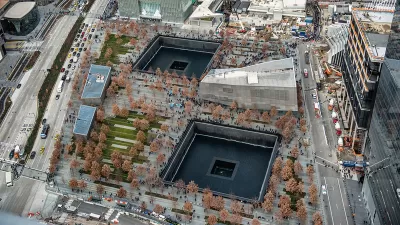The account of how the terror and tragedy of 9/11 led an urban planner from working for a private consulting firm to working in the public sector.

Working as an urban planner in a private consulting firm on September 11, 2001, Clement Lau—like many people—felt compelled to serve the country and the public in the wake of the tragic attacks of that day. Now, as planner for Los Angeles County Department of Parks and Recreation for the past 13 years, he reflects on how that tragic day directed his career:
Unfortunately, I lacked the aptitude, skills, and physical fitness/abilities to join the military, police, or fire services. However, I knew that I could still serve in other ways and contribute to the betterment of our communities. I had originally wanted to secure a civilian community planner position with branches/units of the military like the Naval Facilities Engineering Command (NAVFAC), but was unsuccessful. Fortunately, the door later opened in 2003 for me to enter the civil service as a planner with the County of Los Angeles. I am pleased and proud to say that I have now been a County planner for over 13 years, and have had many more opportunities to interact with and serve the public than I had as a consultant.
Seeing the devastation and destruction of the Twin Towers and the surrounding structures also impacted my psyche as a planner. I grew up loving big cities, and enjoyed the vibrancy and excitement of being in urban environments. Even though I had not been to Lower Manhattan at that time, I still felt as though my way of life and my love for cities suffered a big blow on that fateful day.
In the source article, he goes on to discuss his visit to New York City and the WTC memorial on the tenth anniversary of attack.
FULL STORY: 9/11: Reflections of An Urban Planner

Alabama: Trump Terminates Settlements for Black Communities Harmed By Raw Sewage
Trump deemed the landmark civil rights agreement “illegal DEI and environmental justice policy.”

Study: Maui’s Plan to Convert Vacation Rentals to Long-Term Housing Could Cause Nearly $1 Billion Economic Loss
The plan would reduce visitor accommodation by 25% resulting in 1,900 jobs lost.

Why Should We Subsidize Public Transportation?
Many public transit agencies face financial stress due to rising costs, declining fare revenue, and declining subsidies. Transit advocates must provide a strong business case for increasing public transit funding.

Paris Bike Boom Leads to Steep Drop in Air Pollution
The French city’s air quality has improved dramatically in the past 20 years, coinciding with a growth in cycling.

Why Housing Costs More to Build in California Than in Texas
Hard costs like labor and materials combined with ‘soft’ costs such as permitting make building in the San Francisco Bay Area almost three times as costly as in Texas cities.

San Diego County Sees a Rise in Urban Coyotes
San Diego County experiences a rise in urban coyotes, as sightings become prevalent throughout its urban neighbourhoods and surrounding areas.
Urban Design for Planners 1: Software Tools
This six-course series explores essential urban design concepts using open source software and equips planners with the tools they need to participate fully in the urban design process.
Planning for Universal Design
Learn the tools for implementing Universal Design in planning regulations.
Smith Gee Studio
Alamo Area Metropolitan Planning Organization
City of Santa Clarita
Institute for Housing and Urban Development Studies (IHS)
City of Grandview
Harvard GSD Executive Education
Toledo-Lucas County Plan Commissions
Salt Lake City
NYU Wagner Graduate School of Public Service





























